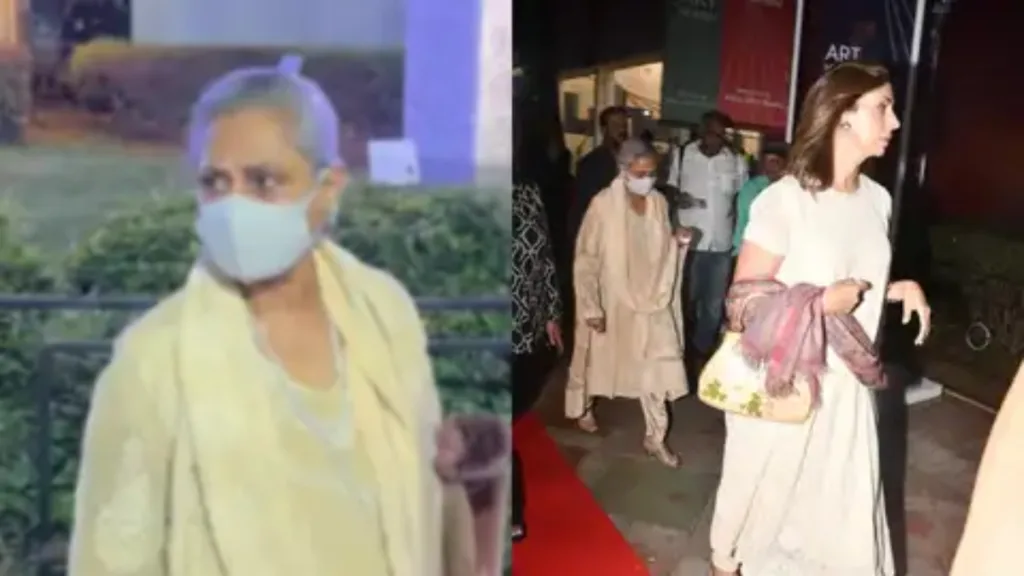Veteran actress and Rajya Sabha MP Jaya Bachchan made headlines during her recent arrival at a Mumbai event with daughter Shweta Bachchan Nanda, when she visibly lost her calm with the crowd of paparazzi gathered outside. On Wednesday, Jaya stepped out wearing a white outfit and a mask, navigating the photographers with Shweta by her side. The moment swiftly turned tense. The longstanding icon paused in her stride, spun toward the lens flashes and gave what many called her signature “death stare.” She then addressed the photographers directly: “Aap log photo lo, badtameezi mat karo. Chup raho, muh band rakho… photo lo… khatam.” The video has since gone viral.
The incident highlights not just a disgruntled moment but an ongoing battle between high-profile public figures and the photographers who follow them relentlessly. Jaya Bachchan has only reiterated what she has voiced several times before—arriving late to events or being surrounded by cameras without consent is a heavy burden. On this occasion, the context may have added weight. The event followed a period of personal mobility and public scrutiny and arriving alongside Shweta made her protective posture more visible.
Witnesses say that the photographers had crowded around her car as she exited the vehicle, trying to capture her walk into the venue. Shweta attempted to lead her mother forward but the tightening circle of cameras meant Jaya slowed down, then stopped, raising her gaze sharply and speaking out. The viral clip shows her issuing the stern words while photographers shuffle back.
This flashpoint raises deeper questions about celebrity privacy in India’s entertainment world. For many stars the routine of being photographed is accepted as part of the job, yet when that routine begins to feel invasive many draw the line. Jaya Bachchan’s visible agitation is a reminder that fame does not erase the human limit to intrusion.
She has, in past interviews and public forums, criticised paparazzi culture, especially when it crosses into personal vulnerability. On her granddaughter Navya Naveli Nanda’s podcast she said that “what they take and what they put out are two different things” and questioned where her freedom was in that exchange. The latest incident underscores that sentiment.
For media-persons this moment serves as both caution and conflict. News outlets and entertainment platforms thrive on candid images; yet constant un-filtered access can lead to negative reactions from those they cover. In some cases the coverage overshadows the event itself. With Jaya Bachchan, an actress with decades of public life, the boundary between public persona and private presence became evident in a single moment of stare and dialogue.
The public response has been varied. Some netizens applauded Jaya’s stance and asked photographers and media to give celebrities a break. Others criticised her for overreacting, arguing that being clicked is part of the public image. Regardless of the split opinions what remains clear is that the clip has reignited discussions on boundaries and consent in celebrity reporting.
For Jaya Bachchan the message seems to be simple but vital: fame doesn’t mean acceptance of all forms of access. As a senior star and political figure she retains a right to dignity even under the flashing lights. In saying “muh band rakho… khatam” she drew a firm line — one that many stars may privately feel yet rarely voice.
In Bollywood’s daily churn of fashion arrivals, red-carpet poses and public greetings, the moment stands out for its raw clarity. It is not about anger but assertion, not about confrontation but boundary. For Shweta who was present such a moment adds another dimension to the family-star narrative, legacy, image, independence and protection all interwoven.
Clips like this remind both photographers and stars that the visibility pact is not without limits. For the audience and fans, the moment is a rare glimpse behind the glamour: a reminder that even icons have their tipping point.

